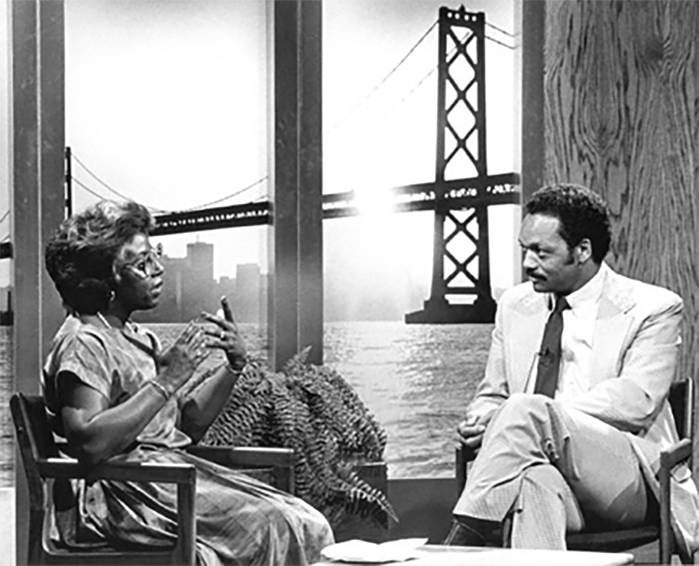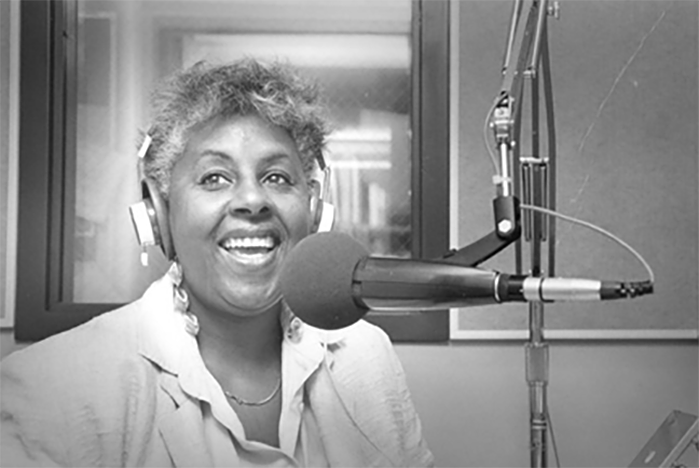Claire Mack
Broadcaster and TV producer
Community development director, KCSM
San Mateo City Councilwoman, 1991–2004, and mayor, 1999–2001
Entrepreneur
“You can play with all the black keys or you can play with all the white keys. But you can play a concerto with all the keys.”
– Claire Mack
As one of the first Black broadcasters to host major-market public-affairs shows—starting more than 50 years ago at KGO and KCSM—Claire Mack helped change the face of American television. She paved the way for careers like Oprah Winfrey’s and brought the diversity of American life into Bay Area households. As a San Mateo city councilwoman and its first African-American mayor, she worked to bring fairness and good urban planning to all residents.
Mack was born in San Mateo in 1936. Her family moved here in 1913 for the construction opportunities on the growing Peninsula. She dropped out of San Mateo High School after marrying her husband, Eddie, in her junior year. In those days, married females were not allowed to attend public schools for fear of corrupting other girls.
“I decided early in my marriage that I couldn’t be a dumb person,” Mack told KCSM colleague Rick Zanardi in a 2009 interview. She got her high school diploma via correspondence and made her first college forays at CSM’s Delaware campus.
“Finally, I came up to College Heights and took an English class from John Turner. He said my writing had potential. I started connecting with my classes.”
Through CSM’s top-ranked broadcasting program, Mack connected in particular with the life-changing potential of television.


“By that time, TV was pretty ensconced in our society,” she said. “I’d worn out two or three televisions already. And I was very upset because there were very few people of color on TV. When there was someone, we’d get on the phone and call people: ‘Turn on Channel 7. Nat King Cole is on!’ Or any Black person! Because there were so few.”
Mack’s quick wit, clear voice and outgoing personality, along with her KCSM training, made her a compelling on-air talent. Doug Montgomery, who ran CSM’s television department, and his KCSM-FM counterpart Dan Odum worked hard to find Mack paid work while she was still a student in 1970.
At her first KGO interview, she said, “A gentleman told me, ‘Your face is too dark; your lips are too big; I sell faces and yours won’t sell.’
Hearing this, Montgomery and Odum made phone calls. Soon after, KGO hired Mack to do talk radio and a weekend public-affairs show and, when that job ended in 1971, Mack returned to KCSM. She also earned BAs in broadcasting and community development from Antioch College.
“For me TV isn’t about looks,” Mack said. “It’s one of the best learning tools that has ever been invented. What Jacques Cousteau conveyed about the ocean, you couldn’t put in books.”
In the 1970s, a time of creativity and change, Mack and her KCSM colleagues had considerable freedom. “We put on some of the best television around,” she said. “We’d see some of the same guests the next week on the stations in San Francisco.”
Mack interviewed the Rev. Jesse Jackson for KCSM-TV during his 1984 campaign for the Democratic presidential nomination. She was live on the air during the 1989 Loma Prieta earthquake.
“When Loma Prieta hit ... we were able to report the collapse of Interstate 580 and the Bay Bridge because people were calling us and telling us,” she said.
In a happier version of An American Family, a 1973 documentary series about affluent Santa Barbarans, Mack turned a camera on her own husband and kids to televise events like a family birthday party.
“Rick Zanardi said, ‘I don’t really understand the purpose of the program. It seems Black people do the same things white people do.’ That was the point.
“Being American is so universal. And we [Black Americans] are so American. When I was in city government, I was asked to serve on the Human Relations Commission. I said no, I wanted to be on Parks and Rec. Black people like grass and swings and slides and trees and the stuff everyone else does.”
As community development director for KCSM, Mack founded Jazz on the Hill as a concert fundraiser for the station. She put on the initial event with five other CSM women including Bonnie Zanardi, who thought up the name.
“The first concert was on the girls’ softball field,” Mack said. “We cleared about five dollars. After that, the program never lost money. That was an exciting thing.”
Mack went into politics, she said, for “the very reason I did those TV shows. There were people in the world who didn’t know I wanted the same things they wanted.”
A proposal to replace a large neighborhood near hers with public housing spurred her to run for San Mateo City Council in 1990. “There’s nothing wrong with an old house,” Mack said. “Not everybody wants to live in a high-rise. Here in America, we know how to build badly very well.”
At a party to announce her candidacy, police arrived and advised of a bomb threat. Still, Mack won easily and was re-elected twice, serving on the council from 1991 to 2004 and as mayor from 1999 to 2001.
After retiring from KCSM in 1998, Mack has concentrated lately on her longtime side business, baking cakes. Claire’s Crunch Cakes was inspired by a toffee-covered cake Mack encountered at Blum’s, a long-gone Bay Area confectionery. Today, Mack’s phone rings nonstop for orders of mocha, lemon or strawberry cake paved in honeycomb crunch.
“TV is wonderful,” Mack said. “Certainly it can be bubblegum for the brain. But to be able to be at presidential inaugurations ... TV has brought that into your house and set it down.
“I never dreamed I’d live in a world like that, and no idea I would be able to participate. Luckily there were the Doug Montgomerys and the Dan Odums and the Jacob Wienses in the world who helped me become better in my craft.
“This wonderful thing we have in College of San Mateo, let’s work with it and keep it going.”

